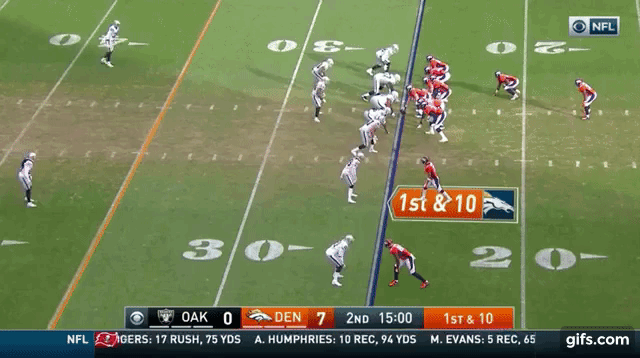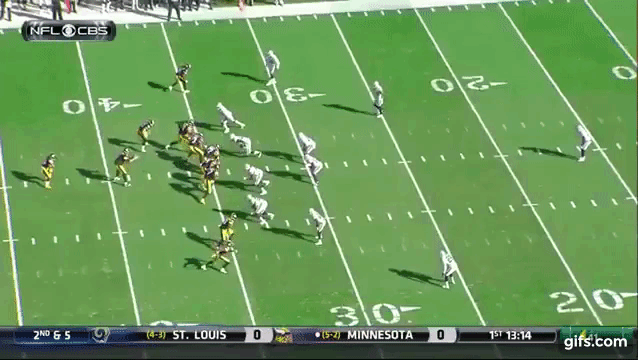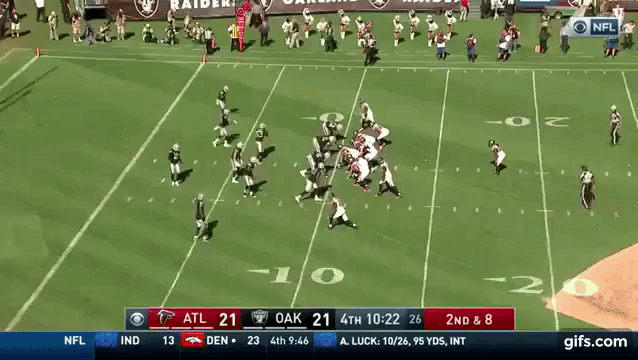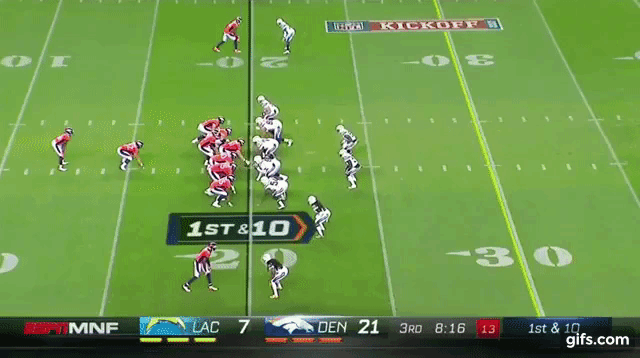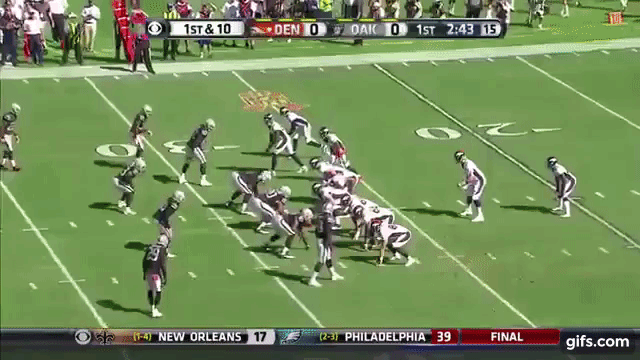© 2025 ALLCITY Network Inc.
All rights reserved.

You can tell a great player by how impressed you are when you watch their worst games. Let me tell you, the Oakland Raiders’ Khalil Mack is a great one.
When putting this together, the idea was to find games that the Raiders lost in which Mack wasn’t supremely impactful, in particular games in which he didn’t have a sack. We found five such contests (two which were against the Denver Broncos) dating back to 2015 and even then No. 52 made his presence felt. Even without sacks, Mack can dominate against the run and will still create pressure, hit the quarterback, or draw flags.
In one such game, he led the Raiders in tackles, in another, he hit the QB four times. Simply put, he’s a beast and one of the few players in the NFL who’s in the same elite class as Von Miller.
Of course, with talents of that magnitude, stopping them entirely isn’t realistic but slowing them down can be done. Something we’ve seen some teams manage to do to Von, though, like Mack, he still manages to impact things.
That’s why we went back to re-watch tape of the AFC West’s other elite pass rusher, to figure out how he can be limited by Denver this week in a must-win divisional game.
Commonalities
If there’s a common theme in all the Raiders losses we watched in which Mack was limited to zero sacks, it’s that the opposing offense was able to run lots of plays and keep the defense on the field.
A fresh Mack won’t work for you. Keeping him tired is crucial. That means the pressure is on Denver’s offense to sustain drives, something they’ve done much better this season. It also means the Broncos’ defense will have to keep Oakland’s offense off the field, as forcing punts and turnovers become even more of a focus in keeping Khalil away.
Maintaining a balanced offense is also a key and running the ball with consistency is crucial in that, as the five teams we analyzed ran the ball an average of 30 times per game. Abandoning the run isn’t a possibility as that’s exactly when Mack will start stacking sacks.
Another key is keeping Mack outside and allowing for a clean pocket inside for your quarterback to step into. Do that, and you’ll have a chance, but if you allow interior pressure, it’ll be a long game. Unheralded offensive tackles like the Cincinnati Bengals’ Andre Smith, or the Pittsburgh Steelers’ Marcus Gilbert, or even Donald Stephenson and Michael Schofield have had success by simply keeping Mack outside for two to three seconds.
Every team also seemed to purposely run away from Mack for the most part, as the few times you do run his way he rarely loses ground or doesn’t make a play.
Different approaches
One way in which the Steelers attacked Mack in what was likely his worst game the past two years – zero tackles in a 35-38 loss back in 2015 – was by running star receiver Antonio Brown his way.
First, the Steelers got lucky on a Brown reverse to Mack’s side in which he was barely blocked out of the way. Soon after that, they threw a few screens to his side forcing him to defend out on the perimeter or chase plays down in pursuit, thus keeping him on his toes.
Of course, like Mack, Brown is a one of a kind talent, but Emmanuel Sanders could be used similarly. Throwing screens out to Mack’s side is a clever way to force him out of the trenches and keep him occupied with blockers other than your tackles.
The Steelers, like the Bengals in a 33-13 win back in 2015, attacked the Raiders defense with endless spread formations. Thus allowing the quarterback out of the shotgun to make quicker reads and throws to get the ball out on time. Speed in decisions and delivery is crucial when attacking a pass rusher of this caliber.
The Raiders actually tried to move Mack around a decent amount against the Broncos in 2016, but Russel Okung had a nice game when facing Mack one on one. If Oakland tries this again, Garett Bolles will need to be up to the task when they’re matched up.
Scheme
There are a few approaches that teams have taken to attack Oakland and in particularly Mack. Cincinnati and Pittsburgh chose to spread him out operating out of the shotgun a bunch. Aside from the advantage of being in shotgun this also forced Mack to have to flex out and play in coverage on tight ends from time to time.
Pittsburgh found plays to force Mack in space and forced him to choose between rushing the QB or covering a receiving target who was put in motion to his side. Doing so wasn’t necessarily always effective, but it forced Mack into high-pressure situations, simply trying to tire him out.
In 2016, the Broncos (Week 17) and Atlanta Falcons (Week 2) decided to play a lot more out from under center. In those looks, they featured lots of heavy formations with multiple tight ends and backs, all to the strong side of the formation where Mack plays most of the time. Doing this forced him to work through lots of added blockers.
We actually saw this out of the Raiders against the Broncos in 2016, where they did their best to lesson Von Miller’s impact in a decisive 30-20 win. In that game, Oakland didn’t just use tight ends but threw in extra offensive tackles to try and limit Miller’s impact. Denver’s already implemented this strategy this season against the Los Angeles’ Chargers’ talented pass rushing duo by inserting Stephenson in the game as a sixth offensive lineman, a scheme we broke down here.
Interestingly enough, when Oakland did this to counter Von, their offensive coordinator was Bill Musgrave who’s now Denver’s quarterbacks coach. Could Musgrave whisper into Mike McCoy’s ear and suggest a similar strategy to stopping Mack as they did Von?
That’ll certainly be something to watch for this Sunday.
Who needs to step up for Denver
Against an opponent of Khalil Mack’s caliber limiting him is a team job. So while right tackle Menelik Watson will likely be faced with the brunt of stopping the Raiders phenomenal edge rusher, he won’t be alone. However, Watson needs to keep Mack outside where help can come his way. That means he can’t overextend or fall for counters and allow inside moves.
Virgil Green should be expected to help in a major way after his worst game of the young season to the Buffalo Bills. Green was superb in the first two games, truly shining as a blocker and he’ll need to do so again. Virgil has shown himself to be steady, both as a strong-side blocker or when shifted into the backfield, he’ll be crucial in this game in slowing Mack down.
If Watson or Green get beaten to the inside, Trevor Siemian could be in big trouble as there are few players as effective in closing down plays once they’ve created penetration.
Siemian’s ability to read Mack pre-snap will be crucial as will his ability to stay poised in the pocket and step into his throws. For that to happen, the interior offensive line needs to be on top of their game, meaning Matt Paradis and Ronald Leary must continue their strong play, while the contentious left guard spot will need to be at its best. If Siemian is forced out the pocket, he likes to run to his arm side, which is exactly where 52 will be waiting to pounce.
Last time the Broncos and Raiders played one another, Mack was held to only a single quarterback hit but he still had three tackles for a loss against the run in a convincing 24-6 Denver win. Things won’t be so easy this time around with a healthy Derek Carr who should keep the game much closer.
Regardless, keeping Mack at bay and limiting his impact in pass protection will be crucial if Denver is to win Sunday in what’s already a must-win divisional bout.
Comments
Share your thoughts
Join the conversation



